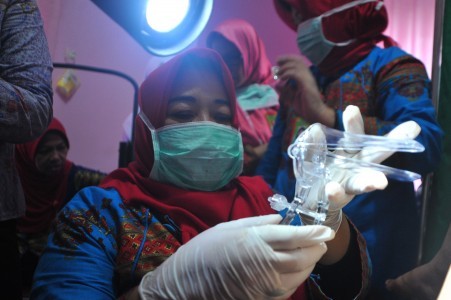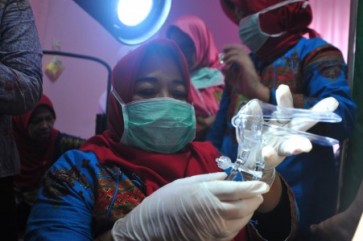Popular Reads
Top Results
Can't find what you're looking for?
View all search resultsPopular Reads
Top Results
Can't find what you're looking for?
View all search resultsIndonesia’s cervical cancer-free future: How it is possible
In Indonesia, cervical cancer is the second leading cause of cancer death in women.
Change text size
Gift Premium Articles
to Anyone
D
ue to its huge impact on quality of life, cervical cancer has become a major public health threat countries aim to eliminate by 2030. Like other cancers, cervical cancer can be detected early and treated successfully.
Yet, it remains the fourth most common cancer in women globally, with an estimated 604,000 new cases and 342,000 deaths in 2020. Around 90 percent of new cases and deaths were reported in low- and middle-income countries, World Health Organization data show.
In Indonesia, cervical cancer is the second leading cause of cancer death in women. According to GLOBOCAN 2020 data, more than 36,600 new cases of cervical cancer were recorded in 2020, or 17.2 percent of over 213,500 new cancer cases in females. Cervical cancer, the main type of cancer linked to human papillomavirus (HPV), killed 21,003 women in 2020, which means 57 women die of cervical cancer every day in Indonesia. Without sufficient preventive measures, the cervical cancer death rate may increase by 50 percent in 2030.
Showing the urgency to fight cervical cancer, the health minister recently issued a decree on the expansion of the HPV immunization program. Under this new regulation, it is likely that the government will soon roll out a mandatory HPV vaccination program nationwide.
During a work meeting with members of House of Representatives Commission IX, which oversees health affairs, on Jan. 25, Health Minister Budi Gunadi Sadikin confirmed HPV immunization would be made mandatory.
According to Budi, the HPV vaccine is a lot cheaper than medical expenses of cervical cancer treatment. The HPV vaccine is one of three new vaccines included in the national immunization program this year, apart from the pneumococcal conjugate vaccine (PCV) for childhood pneumonia prevention and the rotavirus vaccine as a diarrhea intervention.
Despite the COVID-19 burden, the government has been widely praised for striving to achieve its cervical cancer elimination goal by 2030. The Health Ministry’s attempt to expand its HPV immunization demonstration project for school children in 2022 evinces this commitment.


















